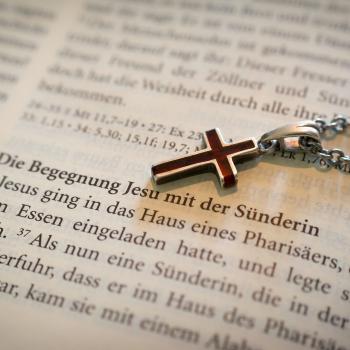On a recent visit home, my evangelical mother informed me, with horror, that my six-year-old daughter Sally doesn’t know Jesus Loves Me. She tried to keep it light and almost funny, I think. I’ve set boundaries with her and she has generally respected them, but one thing I haven’t done is told her I’m an atheist. Partly I want to preserve her peace of mind. At least this way she can imagine I’m saved. Partly I just don’t know how she’ll react. I think she knows, though, deep down, and is afraid to admit it to herself. Hence her not wanting to make a huge deal out of my daughter’s lack of knowledge, but her need to at least give me a hard time about it.
Later, in the car on the way home, I asked Sally what she and her grandmother had talked about. “About God,” she said. Sally doesn’t believe in God. She told me this several weeks ago, after some serious thought on her part—serious thought for a six-year-old, at least. She also doesn’t believe in fairies, she said, and that, I knew, was a much more difficult admission. She had believed in fairies since she was little. It meant a lot to her.
I’d already explained to Sally already that each set of her grandparents believed different things about God, and that her father and I don’t believe in a God at all. I told her that there are lots of different beliefs about God, and I read her picture books about world religions. I told her that she’d need to decide for herself what she believes, someday. As a result, I have not been that worried about my mother talking to Sally about God. Sally knows that different people believe different things, and she accepts that. Honestly, I think she finds it more strange that her grandmother doesn’t approve of the phrase “what the heck” than she does that she believes in God.
But as I sat there, in the car, I worried, for a moment. I worried because my mother doesn’t just believe in God, she also believes in hell, and she very strongly believes that everyone who doesn’t share her beliefs will be tortured in hell for eternity. Sally didn’t yet know about hell. I remember worrying, as a child, that I would go to hell, and I remember worrying the same as a newly deconverted adult. I don’t want Sally to share that fear. But how, I wondered, could I explain the insistency that would likely accompany her grandmother’s beliefs, if it hadn’t already?
“Grandma believes very strongly that everyone should believe the way she does,” I started, trying to explain. “This was a bit of a problem for me when I grew up and started forming my own beliefs.”
“Oh, so she thinks everyone born from her should believe the same things she does.”
“Yes,” I said, surprised by her level of perception, “But also everyone else as well. But I remember that I didn’t like being told what to believe, and that I wanted to be able to choose my own beliefs, so that’s what I want for you. I want you to be able to choose your beliefs for yourself. You don’t have to have it all figured out now, though. You have time.”
“Like when I’m eight or ten or something?” Sally asked.
“You know what? I’m almost thirty and I still don’t have it all figured out. Plus, you can change your mind however many times you want.”
“What! You still don’t have it all figured out?!” Sally was incredulous. Aren’t parents supposed to know everything, after all?
“Nope, I don’t. And you know, it’s not just your grandmother who wants everyone to believe the same things she does, a lot of other people want that too.”
“So like they will tell me what to believe, and I will have tell them no, I don’t want to believe that?”
“Sometimes, yes.”
“But what if they hurt me?” Sally asked.
“Oh, honey, we live in a country that has freedom of religion,” I told her. “It’s your right to pick what you want to believe, and nobody can stop you.”
Later on, our conversation continued, this time initiated by Sally.
“Grandma said that evolution is a myth, but that’s not true, because evolution is science, and science is real.”
“Yes,” I responded.
“I believe in evolution, because science is true,” Sally continued.
“Yes. But tell me, how do we know that what science says is true?”
“Because there are scientists!” Sally was indignant.
“Well, no, it’s because we can test it.”
“Oh.”
“And sometimes scientists get things wrong,” I added. “But then other scientists can come along and test the things they’re saying and see if they’re true, and correct them if they’re not.”
For a while, there was silence as we drove. Then Sally had another thought.
“Oh! Because evolution is true that means God isn’t real!”
“Well, some people believe in both God and evolution,” I explained.
“But how?”
“They believe God started evolution and then watched it happen,” I answered.
“Oh.”
“Some people believe in God and not evolution, some people believe in evolution but not God, and some people believe in both.”
“What do you believe in, Mom?”
“I think evolution is true, but I don’t think there’s a God,” I told her.
“Oh, so you just believe in science.”
“Well yes, but also love, and kindness, and treating others well, and making the world a better place.”
“That’s what they teach at my school!” Sally exclaimed.
After more silence, Sally started the conversation again.
“Mom, when you die you’ll find out if you go to heaven or not.”
“Well, I don’t think there is a heaven,” I told her. “I think when I die it will be just like when a tree dies.”
“Well, maybe there is a tree heaven,” Sally countered.
“But we don’t have any evidence of a tree heaven,” I pointed out.
“Maybe we just can’t see it.”
“Maybe there is an invisible elephant across the room that we can’t see, hear, or smell,” I noted.
“What!”
“My point is that when there’s no evidence for something, we usually conclude that it doesn’t exist.”
I don’t think Sally was completely convinced, and she doesn’t have to be, but she’s not unfamiliar with the concept. She’d told me she’d rejected her belief in fairies due to lack of evidence, after all. But then, she’s still a child, still trying to sort out this big confusing world around her. She doesn’t have to have it all figured out. In some ways, the journey is more interesting than the destination.
I haven’t banned my mother from telling Sally about God for several reasons. For one thing, I’d rather not come right out and tell my mother that I’m an atheist. For another, I don’t want to keep Sally from information about religion anymore than I want to raise her in a religion. She’s going to have to figure out how to navigate this world at some point, and that means interacting with people like her grandmother.
And honestly, one reason I’m as comfortable with her spending time with my mother as I am is that my mother has shown a willingness to bend on certain things. I told her years ago, outright, that she was not to spank my children, and she has respected that in spite of her belief that the Bible mandates corporal punishment. When I leave my children with mother and younger siblings, not overnight but to go out to dinner with my husband and close-in-age siblings, I usually take a moment to go over childcare with my mom, noting what she should do should there be any issues, and she has always honored that. She told me several years ago that she had come to terms with my parenting after seeing a friend of hers struggle with watching her adult daughter yell at and otherwise abuse her children.
On our last visit, my mom asked me flat out what church we were going to. We attended a Unitarian Universalist congregation, I said. There was silence, and, feeling brave, I rushed in to fill it. “I love that they teach children in their children’s ministry about a variety of different religions and beliefs,” I told her. “I want Sally to be able to form her own beliefs.” My mom looked concerned, and I can understand why, from her perspective. “Just so long as she doesn’t forget that Jesus is the rock and foundation,” she said.
In fact, now that I think about it, it was the day after this conversation that my mother informed me that my daughter doesn’t know Jesus Loves Me. Perhaps my statement regarding the UU church made her resolve to query my daughter about her knowledge of God. If so, I’m okay with that. After all, I do want Sally to be exposed to Christianity, including evangelical Christianity, along with other religions and beliefs—and besides, Sally didn’t seem bothered by the conversation.
In fact, when we visit my parents we generally go to their church with them, as a courtesy and because they’re friends want to see us and the kids. During service I used to just take the kids to the gym to eat donuts, or to the church library, but last time we visited my mom suggested we send Sally to Sunday school and Bobby to the nursery. I talked to Sally about this and reminded her that grandma’s church teaches different things than our church teaches. “I will pay attention anyway,” she said, “Because it might be interesting to learn about what they believe.”
If my mother becomes coercive or manipulative toward Sally vis a vis religion, I will shut it down in a heartbeat. I’m still trying to balance all of this and haven’t gotten it all figured out. Perhaps I should bar my mother from discussing religion with my daughter upfront after all, but then, she hasn’t explicitly barred me from discussing my beliefs and ideas with my minor siblings, and I’d rather keep it that way. For now, I suppose, we have struck a tenuous balance of sorts.
And Sally? Sally seems to be doing just fine.













